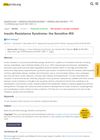
PCOS has a strong genetic basis, but more research is needed to fully understand it.
1 citations,
December 2013 in “BMJ case reports” A pregnant woman with Werner's syndrome died during childbirth, but her baby survived and did not have the syndrome.
 1 citations,
January 2009 in “Drug delivery system”
1 citations,
January 2009 in “Drug delivery system” Anti-aging treatments like hair transplants, minoxidil, and finasteride effectively promote hair growth.
September 2024 in “Journal of Ethnopharmacology” Terminalia bellirica extracts effectively promote hair regrowth and treat androgenetic alopecia.
 August 2024 in “Quality in Sport”
August 2024 in “Quality in Sport” Lifestyle changes like diet and exercise are crucial for managing PCOS.

The Chromolaena odorata patch significantly speeds up wound healing.
January 2024 in “Biomedicines” The review shows that skin symptoms like chronic fungal infections, hair loss, and skin depigmentation are key for early detection and management of APECED.
 August 2023 in “Medical Hypotheses”
August 2023 in “Medical Hypotheses” Metformin, usually used for diabetes, can also help treat hair loss from alopecia areata due to its ability to reduce inflammation and stimulate new hair growth.
Ribonucleotide excision repair is crucial to prevent skin cancer.
 November 2022 in “Journal of Investigative Dermatology”
November 2022 in “Journal of Investigative Dermatology” Apocynin may protect skin cells from aging and damage caused by UVB light.
 February 2022 in “Obstetrics and gynaecology cases - reviews”
February 2022 in “Obstetrics and gynaecology cases - reviews” PCOS can cause unusual symptoms like late puberty and enlarged clitoris, making diagnosis difficult.
 December 2021 in “The Journal of clinical endocrinology and metabolism/Journal of clinical endocrinology & metabolism”
December 2021 in “The Journal of clinical endocrinology and metabolism/Journal of clinical endocrinology & metabolism” Men can have genetic risks for PCOS-related traits like obesity and diabetes.
August 2021 in “Pediatrics in review” The girl's hirsutism and menstrual issues were caused by a benign ovarian tumor, which was successfully removed.

Insulin resistance is linked to many health problems and is influenced by diet, genetics, and other factors.
 December 2017 in “Dong-ui saengni byeongni hakoeji”
December 2017 in “Dong-ui saengni byeongni hakoeji” Cynanchi Wilfordii Radix has strong antioxidant effects and may help treat male hair loss.

Losing weight and eating better are key to managing metabolic syndrome and its related conditions.
 April 2016 in “JAMA Dermatology”
April 2016 in “JAMA Dermatology” Acne is not a key diagnostic feature for PCOS, postadolescent men with acne may have insulin resistance, melanoma patients often have few moles, tumor size in CSCC indicates higher risk of serious outcomes, and hidradenitis suppurativa is linked to higher risk of heart problems and death.
 July 2015 in “Cambridge University Press eBooks”
July 2015 in “Cambridge University Press eBooks” The document concludes that careful history and physical exams are crucial for accurately diagnosing polycystic ovary syndrome and distinguishing it from other similar conditions.

The document concludes that accurate diagnosis and management of PCOS are crucial due to its associated health risks.
Women with acne may have a higher chance of having PCOS, which can lead to other health problems.
May 2010 in “Deleted Journal” PCOS causes menstrual issues, infertility, and long-term health risks.
 August 2008 in “Obstetrics & gynecology science”
August 2008 in “Obstetrics & gynecology science” Polycystic Ovary Syndrome (PCOS) is a complex disorder with both immediate and long-term health effects, including menstrual issues, infertility, and increased risk of diabetes and heart disease.

Finasteride reduces prostate cancer risk but may increase high-grade tumors; new drugs and better diagnosis are in development, but funding and industry commitment are challenges.

The document concludes that Syndromes of Severe Insulin Resistance are rare disorders with limited treatment options.
 January 2001 in “Cambridge University Press eBooks”
January 2001 in “Cambridge University Press eBooks” Early signs of PCOS in girls, like irregular periods and polycystic ovaries, suggest a need for early diagnosis and intervention to prevent further health issues.
March 2023 in “Journal of Drugs in Dermatology” Hormonal therapies, especially antiandrogens, can help manage Hidradenitis Suppurativa.
95 citations,
October 2007 in “International Journal of Dermatology” A new method accurately classifies hair types, showing global hair diversity.
63 citations,
April 2005 in “Mechanisms of development” Mice with too much Claudin-6 have skin barrier problems and abnormal hair growth.
51 citations,
September 2012 in “Biomacromolecules” Disulfide bonds make keratin in hair stronger and tougher.
 34 citations,
March 1999 in “Journal of The European Academy of Dermatology and Venereology”
34 citations,
March 1999 in “Journal of The European Academy of Dermatology and Venereology” Bald men may have higher heart disease risk.



















